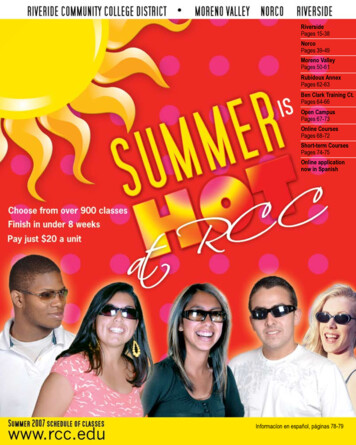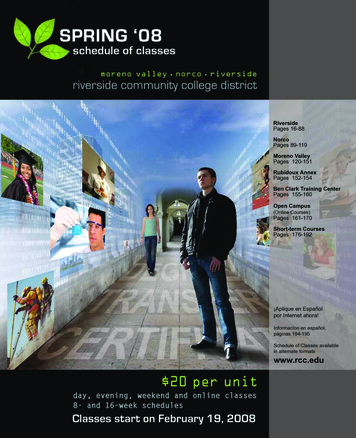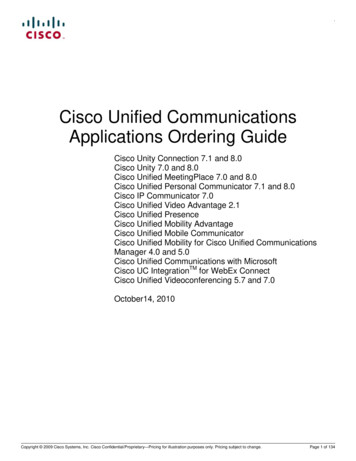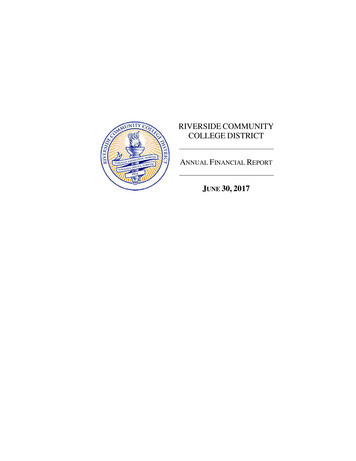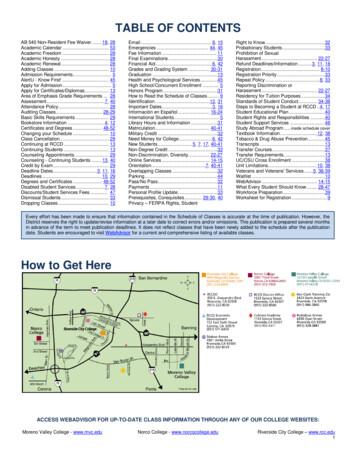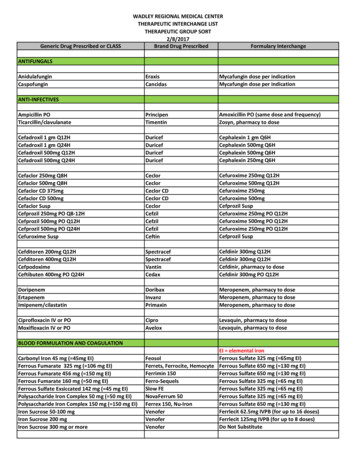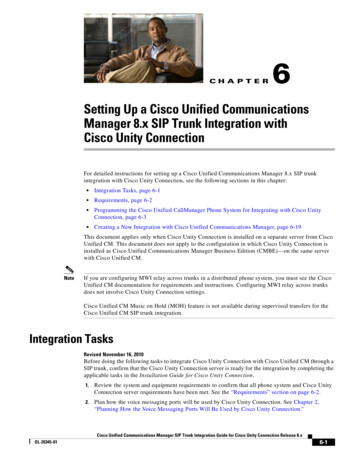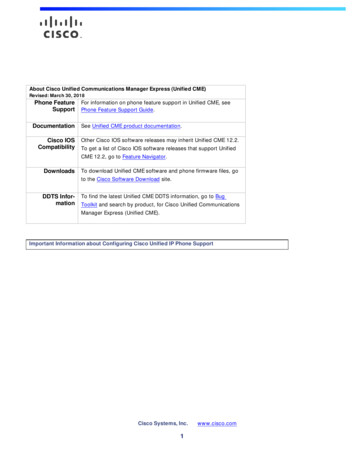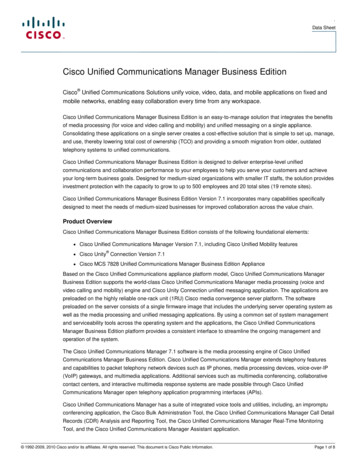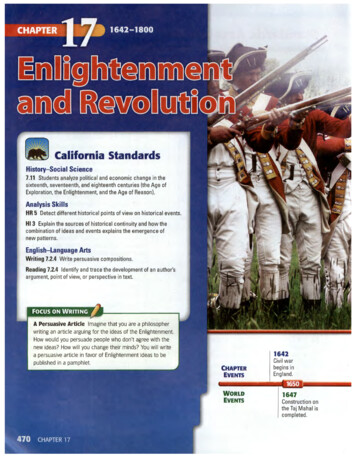
Transcription
California StandardsHistory-Social Science7.11 Students analyze political and economic change in thesixteenth, seventeenth, and eighteenth centuries (the Age ofExploration, the Enlightenment, and the Age of Reason).Analysis SkillsHR 5 Detect different historical points of view on historical events.Hl3 Explain the sources of historical continuity and how thecombination of ideas and events explains the emergence ofnew patterns.English-Language ArtsWriting 7.2.4 Write persuasive compositions.Reading 7.2.4 Identify and trace the development of an author'sargument, point of view, or perspective in text.A Persuasive Article Imagine that you are a philosopherwriting an article arguing for the ideas of the Enlightenment.How would you persuade people who don't agree with thenew ideas? How will you change their minds? You will writea persuasive article in favor of Enlightenment ideas to bepublished in a pamphlet.1642CHAPTEREVENTSCivil warbegins inEngland.WORLD1647EVENTSConstruction onthe Taj Mahal iscompleted.
History's lmpad.,. video seriesWatch the video to understandthe impact of the Declarationof Independence on thedevelopment of Americangovernment and society.1690John Lockeargues thatgovernment'spower shouldbe limited .1707TheMug halEmpireends inIndia.1759 MaryWollstonecraftis born inLondon.1776TheAmericancoloniesdeclare theirindependence.1769Spanishmissionariesbegin foundingmissions inCalifornia.Tupac Amaru leads apeasant revolt againstPeru's colonial rulers.ENLIGHTENMENT AND REVOLUTION471
will see the roots of our modern government, aFocus on Themes This chapter will introduceyou to the Enlightenment, an era of great politicalthinkers, writers, and activists. You will learn aboutsome of these figures, among the most influentialpeople in all of world history. In their ideas, yougovernment brought about by bold statesmenwho inspired a revolution. You will also see howsimilar revolutions changed society and culturein countries around the world.Points of View in Historical TextsAdditionalreading supportcan be found in theFocus on ReadingHistory is made up of issues, questions aboutwhat to do in a particu lar situation. Throughout history, people havelooked at issues from all sides. Each person's view of the issue shapedwhat he or she thought should be done.lrrte ctiv- Identifying Points of View The way a person views an issue is calledReader andhis or her point of view, or perspective. Points of view can be shaped bymany factors, such as a person's background or political beliefs. When youread a historical document, figuring out the author's point of view can helpyou understand his or her opinions about an issue.Thomas Jefferson, from theDeclaration of IndependenceStudy GuideConsider the author'sbackground-jefferson w as aleader in t he American colonies.The history of the present King of Great Britainis a history of repeated injuries and usurpationgall having in direct object the establishment ofa direct Tyranny over these States. To prove this,let Facts be submitted to a candid world.He has refused his Assent to Laws, the mostwholesome and necessary to the public good.He has forbidden his Governors to pass Lawsof immediate and pressing importance, unlesssuspended in their operation till his Assentshould be obtained; and when so suspended, hehas utterly neglected to attend to them.Look for emotionallanguage-Words like injuriesand usurpations make jefferson'sopinion clear.Look at the evidencejefferson uses only examples of theking's flaws.1- Put it all together to determine theauthor's point of view-jefferson wasopposed to the policies of the English kingand wanted a change in government.472CHAPTER 17
You Try It!Chapter 17Read the following passage from this chapter. Then answer thequestions that follow.Enlightenment (p. 474)secular (p. 475)Voltaire (p. 476)salon (p. 477)Mary Wollstonecraft (p. 477)Section 1RousseauFrench thinker Jean-Jacques Rousseau criticized divine right. He believed in popularsovereignty-the idea that governmentsshould express the will of the people. In TheSocial Contract, published in 17 62, Rousseaudeclared, "Man is born free, but he is everywhere in chains." According,to Rousseau, citizens submit to the authority of governmentto protect their own interests, entering intoa "social contract." This contract gives thegovernment the power to make and enforcelaws as long as it serves the people. The government should give up that power if it isnot serving the people.FromChapter 17,p.480Section 2John Locke (p. 479)natural rights (p. 480)Charles-Louis Montesquieu(p. 480)Jean-Jacques Rousseau(p. 480)popular sovereignty (p. 480)Benjamin Franklin (p. 481)Thomas Jefferson (p. 481)Section 3English Bill of Rights (p. 485)Declaration of Independence(p. 486)Declaration of the Rights ofMan and of the Citizen (p. 489)Think about the passage you have just read and then answer thequestions below.1.What do you think was Rousseau's point of view about France'sgovernment?2.What words or phrases in this passage helped you identify his pointof view?3.How did Rousseau's own beliefs and ideas affect his point of view?4.Do you think Rousseau's point of view was similar to or different fromAcademic VocabularySuccess in school is related toknowing academic vocabularythe words that are frequently usedin school assignments and discussions. In this chapter, you will learnthe following academic words:contract (p. 479)ideals (p. 486)that of the king of France?5.Who do you think would more likely share Rousseau's point of view: awealthy French noble or a colonist planning a rebellion? Why do youthink so?As you read Chapter 17, try to determinethe points of view of the various figuresyou are studying.ENMENT AND REVOLUTION473
If YOU were there .Main Ideas1. The Enlightenment was alsocalled the Age of Reason.2. The Enlightenment's rootscan be traced back to earlierideas.3. New ideas came mainly fromFrench and British thinkers.You are a student in the early 1700s. It seems your teacher canpass or fail whomever he wants. You think the teacher shouldmake his decisions about grades based on what a student haslearned. You come up with a new idea-testing students so theycan prove what they know. You think this idea will improve yourgrades as well as relations in your school.'Will you challenge the teacher's authority?The Big IdeaEnlightenment thinkers built onideas from earlier movementsto emphasize the importance ofreason .Key Terms and PeopleEnlightenment, p. 474secular, p. 475Voltaire, p. 476salon, p. 477Mary Wollstonecraft, p. 477F BUILDING BACKGROUNDIn the 1600s and 1700s, people like thestudent mentioned above began to question sources of authority insociety-particularly those of religion and government. They thoughtthat using reason and logic would lead to improvements in society.Their ideas spread quickly in Europe., ;J The Age of Reason lim7.11.4 Explain how the mainideas of the Enlightenment can betraced back to such movements asthe Renaissance, the Reformation,and the Scientific Revolution and tothe Greeks, Romans, and Christianity.474CHAPTER 17Discoveries made during the Scientific Revolution and on thevoyages of discovery led to changes in Europe. A number ofscholars were beginning to challenge long-held beliefs aboutscience, religion, and government.These new scholars relied on reason, or logical thought,instead of religious teachings to explain how the world worked.They believed human reason could be used to achieve threegreat goals-knowledge, freedom, and happiness-and thatachieving these goals would improve society. The use of reasonin guiding people's thoughts about philosophy, society, andpolitics defined a time period called the Enlightenment. Becauseof its emphasis on the use of reason, the Enlightenment was alsoknown as the Age of Reason.Finding Main Ideas How did thethinkers explain the world?'WtJ1'J""tt··a"?''Enlightenme t
The Enlightenment's RootsThe main ideas of the Enlightenmenthad their roots in other eras. Enlightenment thinkers looked back to the Greeks,Romans, and the history of Christianity.The Renaissance, Reformation, and Scientific Revolution provided ideas also.Greek and Roman PhilosophersEnlightenment thinkers used ideas fromthe ancient Greeks and Romans. Greekphilosophers had observed an order andregularity in the natural world. Aristotle,for example, taught that people could uselogic to discover new truths. Building onGreek ideas, Roman thinkers developedthe concept of natural law, the idea that alaw governed how the world operated.With Greek and Roman beliefs asguidelines, Enlightenment thinkers beganstudying the world in a new way. Theyapplied these beliefs not just to the naturalworld but also to the human world of society and government.ChristianityThe history of Christianity in Europe provides other clues about ideas that emergedin the Enlightenment. One theologian,Thomas Aquinas, had taught in the MiddleAges that faith paired with reason couldexplain the world. Although it was indebtedto Aquinas, the Enlightenment was mostlya secular, or non-religious, movement.Enlightenment thinkers disagreed with thechurch's claims to authority and its intolerance toward non-Christian beliefs.The Renaissance and ReformationOther reactions to the Christian Churchin Europe also influenced the ideas of theEnlightenment. For example, some Renaissance thinkers used Greek and Romanideas to raise questions about establishedreligious beliefs. These Renaissance thinkerswere known as humanists.Although most humanists were religious, they focused on human value andachievement rather than the glory of God.
The Enlightenment isalso called the Age ofReason because reason, or logical thought,is a basic part ofall Enlightenmentideas. The ability to reason is what makes humans unique. Reason can be used to solve problems and improve people's lives. Reason can free people from ignorance, superstition, and unfairgovernment. The natural world is governed by laws that can be discoveredthrough reason. Like the natural world, human behavior is governed by natural laws. Governments should reflect natural laws and encourage educationand debate.Renaissance humanists believed peoplecould improve their world by studying itand changing it. These ideas contributedto the Enlightenment idea of progressthe idea that humans were capable ofimproving their world.Some Reformation ideas also reappearedduring the Enlightenment. Like MartinLuther and other reformers, Enlightenmentscholars questioned church authority.They found that religious beliefs didn'talways fit in with what they learned fromtheir logical study of the world.The Scientific RevolutionThe Scientific Revolution also influencedEnlightenment thinkers. Through experiments, scientists like Newton and Galileohad discovered that the world didnot work exactly the way the churchexplained it. Using scientific methodsof study, scientists discovered laws thatgoverned the natural world. Enlightenment thinkers took the idea of natural lawsone step further. They believed that natural laws must also govern human societyand government.Identifying Main IdeasWhat were some movements that influenced theEnlightenment?476 ·CHAPTER 17New IdeasEnlightenment thinkers borrowed ideasfrom history to develop a new worldview.They believed the use of reason couldimprove society. To achieve this progress,they had to share their ideas with others.French PhilosophersFrench philosophers popularized manyEnlightenment ideas. One philosopher,Voltaire (vohl-TAYR), mocked governmentand religion in his writings. Instead oftrusting God to improve human happiness,Voltaire believed humans could improvetheir own existence.Having gotten in trouble for someof his writings, Voltaire also spoke outagainst censorship-removal of information considered harmful. He argued, "I[may] disapprove of what you say, but Iwill defend to the death your right to sayit." His statement emphasized the Enlightenment goal of freedom of thought.Enlightenment thinkers made an effortto share their thoughts with the public.Philosopher Denis Diderot (dee-DROH)edited a book called the Encyclopedia.This book included articles by more than100 experts on science, technology, andhistory. The French king and the popeboth banned the Encyclopedia.j,1
In spite of censorship, Enlightenmentideas spread. One important place for theexchange of ideas was the salon, a socialgathering held to discuss ideas. Womenoften hosted the salons. Most Enlightenment thinkers did not view women as equalto men. However, in hosting salons womencould influence opinions.British WritersWomen and men also began to publish theirideas in books, pamphlets, and newspaperarticles. British writer Mary Wollstonecraft,for example, argued that women shouldhave the same rights as men.Enlightenment thinkers even appliedtheir ideas of freedom and progress to economics. British writer Adam Smith believedeconomics was governed by natural laws.He argued that governments should nottry to control the economy and thateconomic growth came when individualswere free to make their own choices. Likemany Enlightenment thinkers, his ideaswould have a lasting effect.Summarize How didEnlightenment thinkers spread their ideas?Voltaire1694-1778Voltaire is the pen name of the Frenchphilosopher and author Franc;oisMarie Arouet. He used his wit, intelligence, and sense of justice topoke fun at religious intolerance.Voltaire's skill and bold ideasmade him a popular writer. Inhis writings he argued that thepurpose of life is the pursuitof human happiness throughprogress in science and the arts.Drawing Inferences Why didVoltaire poke fun at religiousintolerance?SUMMARY AND PREVIEW Scholars during the Enlightenment drew on ideasfrom previous eras. They proposed ideasabout the importance of reason andprogress. In the next section you willlearn how the Enlightenment changedideas about government.Section 1 AssessmentReviewing Ideas, Terms, and People lim7.11.41. a. Define What was the Enlightenment?b. Explain What was the main goal of mostEnlightenment thinkers?2. a. Define What does it mean to say that theEnlightenment was a secular movement?b. Explain What was the connection between thediscoveries of the Scientific Revolution and theEnlightenment?c. Elaborate How did the idea of natural lawcontribute to the Enlightenment?3. a. Describe How did Voltaire feel about censorship?b. Explain What did Adam Smith contribute toEnlightenment ideas?Critical Thinking4. Summarize Drawa chart like this one.Use it to summarizethe sources ofEnlightenmentGreek and RomanPhilosophersIChristianityRenaissance andReformationideas.5. Arguing for Enlightenment Ideas Review thesection for new ideas about science, religion,women's rights, and economics. How may theseideas help people? Write down what you could sayin favor of Enlightenment ideas on these topics.ENLIGHTENMENT AND REVOLUTION477
If YOU were there .Main Ideas1. The Enlightenment influencedsome monarchies.2. Enlightenment thinkers helpedthe growth of democraticideas.3. In America, the Enlightenment inspired a struggle forindependence.You are in a coffee house, discussing everything from politics toreligion with friends. It is 1770. Suddenly, someone next to youquestions the king's right to rule. Other people begin to agree withthat person. As you listen to their logic, you wonder about otherways to run a government.Would you support a government that didn'tinclude a king or queen? Why or why not? The Big IdeaEnlightenment ideas influenced the growth of democraticgovernments in Europe andAmerica.BUILDING BACKGROUND For centuries, Europe's monarchs hadstruggled with nobles and with church leaders for power. In England,Parliament limited the monarch's power. In some other countries,however, the kings and queens ruled without limits. The Enlightenment would change governments in Europe and in America.Key Terms and PeopleJohn Locke, p. 479natural rights, p. 480Charles-Louis Montesquieu, p. 480Jean-Jacques Rousseau, p. 480popular sovereignty, p. 480Benjamin Franklin, p. 481Thomas Jefferson, p. 481 "lim7.1 1.5 Describe how democratic thought and institutions wereinfluenced by Enlightenment thinkers(e.g., John Locke, Charles-LouisMontesquieu, American founders).478CHAPTER 17-J·jEnlightenment Influence on MonarchiesIn the 1600s and 1700s kings, queens, and emperors ruledEurope. (See the map.) Many of these monarchs believed thatthey ruled through divine right. That is, they thought thatGod had given them the right to rule as they chose. They alsothought they shouldn't be limited by bodies such as England'sparliament. King Louis XIV of France saw himself as the entiregovernment. He declared, L'etat, c'est moil" or "I am the state."Although monarchs such as Louis XIV held the most power,other groups in society also had privileges. In France, for example,the nobles paid few taxes and held the highest positions in thearmy. The French clergy paid no taxes at all. However, most ofthe French people, the commoners, were poor, paid high taxes,and had no role in their government.Outside of France, some monarchs began to change theirideas about how they ruled. They applied Enlightenment ideas togovernment. These rulers became known as enlightened despots.11 -
Habsburg possessions250250500 Miles500 KilometersA despot is a ruler with absolute power.The enlightened despots tried to makelife better for the commoners. They alsothought they could make their countriesstronger if the commoners were happier.Frederick II of Prussia was one such ruler.He approved reforms in law and education. Empress Catherine the Great ofRussia was another enlightened despot.Her reforms gave the Russian nobilitygreater rights and powers.Although the enlightened despotsmade some improvements in their countries, many Enlightenment thinkers lookedfor bigger changes. They began to considerthe need for democracy.Contrasting How do rule bydivine right and rule by an enlightened despotdiffer?P ·UWJ!na;r!U ''Democratic IdeasSome Enlightenment thinkers only challenged the idea of rule by divine right.Others went further.They developed somecompletely new ideas about how governments should work. Three of these thinkersLocke, Montesquieu, and Rousseau-tried toidentify the bestpossibleformofgovernment.The ideas of these Enlightenment thinkerscontributed to the creation of modemdemocracy.LockeThe English philosopher John Locke hada major influence on Enlightenmentpolitical thought. In 1690, he published ACADEMICTwo Treatises on Government. In this VOCABULARYcontract awork, Locke argued for government as a binding legalcontract between the ruler and the people. agreementENLIGHTENMENT AND REVOLUTION479
Because a contract bound both sides, theruler's power would be limited. In fact,Locke thought that government existedonly for the public good of the people.Locke also declared that all peoplehad certain natural rights, which included the rights to life, liberty, and property.He thought that no person was born withspecial privileges. According to Locke, thegovernment should protect the naturalrights of its citizens. If it didn't, the peoplehad the right to change rulers.MontesquieuFrenchman Charles-Louis Montesquieu(mohn-te-SKYOO) was a member of thenobility. He built on Locke's ideas in TheSpirit of the Laws, published in 1748. Montesquieu claimed that a government shouldbe divided into separate branches to protect people's freedom. In this idea, knownas the separation of powers, each branchof government is limited by the others. Asa result, the separate branches must sharepower. None of them can control the government completely.RousseauFrench thinker Jean-Jacques Rousseau(roo-SOH) criticized divine right. He believedin popular sovereignty (SAHV-ruhn-tee)the idea that governments should expressthe will of the people. In The Social Contract,published in 1762, Rousseau declared,"Man is born free, but he is everywhere inchains." According to Rousseau, citizenssubmit to the authority of government toprotect their own interests, entering intoa "social contract." This contract givesthe government the power to make andenforce laws as long as it serves the people.The government should give up that power if it is not serving the people.I;)#J l(UCJil!ii: AnalyzingWhat ideaappears in the works of both Locke and Rousseau?The ideas of Locke,Montesquieu, andRousseau contributedto the creation ofmodern democracy.Who believed inseparation ofgovernmentpowers?480CHAPTER 17John LockeCharles-Louis Montesquieu1632-17041689-1755 Governments power is limited. People have natural rights, such aslife, liberty, and property. The powers of governmentshould be separated intoseparate branches.
The Enlightenmenti AmericaThe ideas of these three philosophersspread throughout Europe. From Europe,they spread to the British colonists living inNorth America. Enlightenment ideas wouldhave a big effect on America's history.The British colonists already knew basicideas about participation in government.Because they were British citizens, thecolonists knew about Parliament and itscontrol over the British monarch. Whenthe British government began to chip awayat what the colonists saw as their rights,the colonists fought back.In North America the French and Britishhad many disagreements. These conflictsled to war. Even though the British eventually defeated the French, years of fightingcost Britain a lot of money.To raise funds, the British government .created new taxes in the colonies. One taxadded to the cost of molasses. Another newtax, called the Stamp Act, required coloniststo pay more for newspapers, some legaldocuments, and other printed materials.People in England didn't have to pay thesetaxes. As a result, the colonists thought thetaxes were unfair. The colonists wanted tobe treated as British citizens. They wantedthe same rights as Europeans.British Policy in North AmericaColonists' ViewsTo learn more about this struggle, we mustgo back to the founding of the colonies.Other countries besides Britain settled andcontrolled land in North America. One ofthem was France.Many colonial leaders were familiar withthe ideas of the Enlightenment. Two leaders in particular-Benjamin Franklin andThomas Jefferson-would apply thoseideas to the colonists' complaints.In 1766 philosopher and scientistBenjamin Franklin went to London. Therehe addressed the House of Commons inParliament. He argued that the Britishgovernment had no right to tax the colonists because they had no representativein Parliament. His argument against "taxation without representation" inspired riotsagainst the tax in the colonies. The riotspersuaded the British government to getrid of the Stamp Act.Thomas Jefferson was a farmer, scientist, and scholar. He had been influenced bythe Scientific Revolution. John Locke wasanother source of inspiration. In keepingwith Locke's ideas, Jefferson believed thatBritain had no right to govern or imposetaxes on the colonies. He supported the ideaof independence for the colonies. Jeffersonalso supported the separation of religiousand political power. In this way, he reflectedthe Enlightenment's secular attitudes.Jean-Jacques Rousseau1712-1778 Governments should express thewill of the people. People enter into a social contractwith their government, giving it theright to create and enforce laws.Focus ONREADINGWhy did thecolonists' point ofview on taxesdiffer from theview of the Britishgovernment?ENLIGHTENMENT AND REVOLUTION'· 48!1
lbe Enlightenment Reaches America1690 John Locke publishesTwo Treatises on Civil Government.1748 Montesquieu publishesThe Spirit of the Laws.1762 Rousseau publishesThe Social Contract.I1766 BenjaminFranklin arguesagainst unfair taxpolicies in theAmerican colonies.1774 ThomasJefferson arguesthat only voluntaryloyalty to the kingties the Americancolonies to GreatBritain.Who might have been influenced byRousseau's writings?Jefferson would later become presidentof the United States. His philosophies andachievements, based on Enlightenment·ideas, helped to establish the democraticgovernment and the rights we enjoy todayin the United States.Finding Main Ideas Whydid some colonists want to be independent ofBritain?Reviewing Ideas, Terms, and People lim7.11.51. a. Define What does divine right mean?b. Explain What did enlightened despots try to do?2. a. Define What are natural rights?b. Explain What did Locke believe was the purpose of government?c. Elaborate Why would separation of powersprotect people's freedoms?3. a. Describe What role did Benjamin Franklin playin the American colonists' disagreement with theBritish government?b. Elaborate Why do you think many Americansconsider Thomas Jefferson a hero?482CHAPTER 17SUMMARY AND PREVIEW In the 1600sand 1700s some European monarchsthought they had a divine right to rule.As Enlightenment thinkers proposednew ways of thinking, people questionedthe monarchs' rights. Democratic ideasspread. In the next section you will learnhow these ideas changed governmentsin England, France, and America.Critical Thinking4. Identifying Cause and EffectDraw a graphic organizer like theone shown. Use it to describe the effect of the British government's\. . /policies on its North American colonies.5. Organizing Ideas about Government Note waysEnlightenment ideas might improve governmentby making it more effective or fair. How wouldyou present your arguments to someone whofavors monarchy or rule by divine right?
JOhn Locke11 Men being, as hasWjould you risk arrest for your beliefsin people's rights?When did he live? 1632-1704Where did he live? England and the NetherlandsIWhat did he do? Locke worked as a professor, physician, and governmentofficial. He wrote about the human mind, science, government, religion, andother topics.Why is he important? Locke believed inthe right of common people to think and worship as they pleased and to own property. Healso had great faith in science and people's basicgoodness. Not everyone liked his ideas. At onepoint Locke fled to Holland to avoid arrest bypolitical enemies. Locke's ideas have inspiredpolitical reforms in the West for some 300 years.been said, by nature,all free, equal, andindependent, no onecan be . . subjectedto the political powerof another, withouthis own consent. Theonly way whereby anyone divests himselfof his natural liberty. . . is by agreeingwith other men tojoin and unite into acommunity. 11- John Locke, fromSecond Treatise of CivilGovernmentDrawing Inferences Why do you think some peopledisliked Locke's ideas?TllFThis book printed in1740 is a collection ofJohn Locke's writings.woRKS0 fJ 0 H N L 0 C K E, Efq;In T hree Volumes. -- .c f.- ·-----The coWf .!-lTS of wl1i h follow in the neXtWithA,LPllA'"TICALv--The1'A L···0 \. l.V o u RTilEo -r oN./.,., L 0 I'0 J', - "" V " " '"'- e-n." . : -.; :::::· r:.: lfl f R I)1-nl-o.!f,ini J f"')'"' 11 Mu-''' .,,!»C., &d . lo t1«1ftR l· ,.ENLIGHTENMENT AND REVOLUTION483
If YOU were there .Main Ideas1. Revolution and reformchanged the government ofEngland.2. Enlightenment ideas led todemocracy in America.3. The French Revolution causedmajor changes in France'sgovernment.You live near Boston, Massachusetts. British soldiers have movedin and taken over your house. They say that the law allows themto take whatever they need. But your father doesn't want thesoldiers living in your house and eating your food. What can he doto f1ght the king's laws?Should your father disobey the king?Why or why not? The Big IdeaRevolutions changed the governments of Britain, the American colonies, and France.Key TermsEnglish Bill of Rights, p. 485Declaration ofIndependence, p. 486Declaration of the Rights of Manand of the Citizen, p. 489rr',;:c-;,- BUILDING BACKGROUND British soldiers in the North Americancolonies were just one sign that trouble was brewing. Ideas aboutthe rights of the people were in conflict with ideas about the rights ofmonarchs. In England, the North American colonies, and France, thisconflict led to violent revolutions.-Revolution and Reform in EnglandEnlightenment ideas inspired commoners to oppose monarchiesthat ruled without concern for the people's needs. However, themonarchs wouldn't give up their privileges. In England, Parliament forced the monarchy to change. lim7.11.6 Discuss how theprinciples in the Magna Carta wereembodied in such documents as theEnglish Bill of Rights and the American Declaration of Independence.484CHAPTER 17Trouble with ParliamentFor many years, the English Parliament and the English monarchy had had an uneasy relationship. Parliament demandedthat its rights and powers be respected. However, the monarchystood for rule by divine right. The relationship between Englishmonarchs and Parliament got worse.The conflict led to a civil war in 1642. Representatives ofParliament led by Oliver Cromwell took over the country. Theking, Charles I, was charged with various crimes and beheadedin 1649. Cromwell became a dictator. The years of his rule weretroubled and violent.,
By 1660 many English people weretir d of turmoil and wanted to restore themqnarchy. They invited the dead king'ssom to return and rule England as CharlesII. They made Charles promise to allowPalliament to keep the powers it had wonin the civil war. These powers included theright to approve new taxes. Parliament wasab e to work with Charles II during most ofhi rule. However, when Charles died andhis brother]ames became king, the troublebegan again.James II, an unpopular Catholic, triedto promote his religious beliefs in England,a Protestant country. As a result, Parliament invited the Protestant William ofOrange, James's son-in-law, to invade England. When William and his wife, Mary,arrived in England in 1688, James and hisfamily fled to France.New Rights for the English PeopleParliament offered the throne to Williamand Mary on one condition. They had toaccept the English Bill of Rights, a documentthat listed rights for Parliament and theEn
Discoveries made during the Scientific Revolution and on the voyages of discovery led to changes in Europe. A number of scholars were beginning to challenge long-held beliefs about science, religion, and government. These new scholars relied on reason, or logical thought, instea


